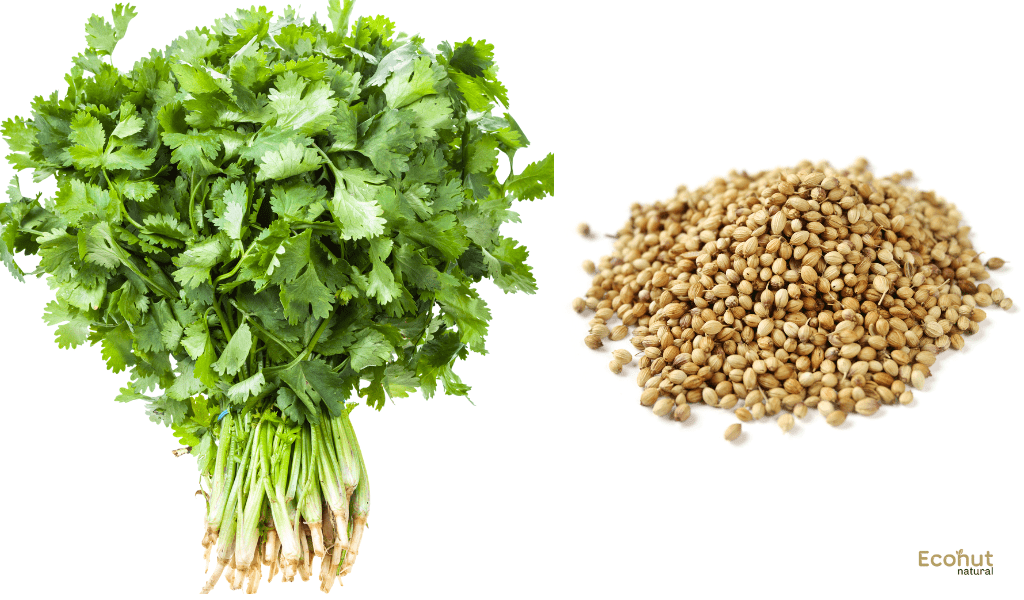Coriander (Coriandrum sativum) is a versatile herb used in cuisines worldwide. It’s a member of the parsley family and is native to regions spanning from Southern Europe and North Africa to Southwestern Asia. Both its leaves and seeds are edible, offering distinct flavors.
Botanical Description
It is a soft plant growing to 50 cm (20 in) tall. The leaves are variable in shape, broadly lobed at the base of the plant, and slender and feathery higher on the flowering stems.
The flowers are borne in small umbels, white or very pale pink, asymmetrical, with the petals pointing away from the centre of the umbel longer (5–6 mm or 3⁄16–1⁄4 in) than those pointing toward it (only 1–3 mm or 1⁄16–1⁄8 in long). The fruit is a globular, dry schizocarp 3–5 mm (1⁄8–3⁄16 in) in diameter. Pollen size is approximately 30 μm (0.0012 in).
Seeds (Coriander):
The seeds, on the other hand, have a warm, aromatic, and slightly citrusy flavor with a hint of sweetness. They are commonly used whole or ground in cooking, especially in Indian, Middle Eastern, and Mediterranean cuisines. Coriander seeds are a key ingredient in many spice blends, such as curry powder and garam masala, and they are also used to flavor various dishes, pickles, and beverages.
Leaves (Cilantro):
The fresh leaves, also known as cilantro, have a bright, citrusy flavor with a hint of pepperiness. They are commonly used in salads, salsas, and various Asian, Latin American, and Middle Eastern dishes. However, cilantro is one of those herbs that people either love or hate, with some describing its taste as refreshing and others finding it soapy or unpleasant due to genetic factors.
Coriander (Coriandrum Sativum) Other Names
Latin Name- Coriandrum Sativum
Marathi Name- Kothimbir
Punjabi Name- Dhania
Bengali Name- Dhania
English Name- Coriander, Cilantro, Parsley
Tamil Name- Kottamali
Gujarati Name- Dhana
Telugu Name- Dhainalu
German Name- Koriander
Hindi Name- Dhaniya, Dhanya
Kashmiri Name- Dhanawal
Urdu Name- Kishneez
Arabic Name- Kuzbura
Italian Name- Coriandalo
Nutritional Value of Coriander
| Nutrient | Content |
| Water | 92.2 g |
| Energy | 23 kcal/95 KJ |
| Carbohydrate, by the difference | 3.67 g |
| Fat | 0.52 g |
| Sugars | 0.87 g |
| Selenium | 0.9 µg |
| Zinc | 0.5 mg |
| Manganese | 0.426 mg |
| Sodium | 46 mg |
| Total dietary fibre | 2.8 g |
| Iron | 1.77 mg |
| Calcium | 67 mg |
| Magnesium | 26 mg |
| Potassium | 521 mg |
| Phosphorus | 48 mg |
| Copper | 0.225 mg |
| Vitamin C | 27 mg |
| Riboflavin | 0.162 mg |
| Pantothenic acid | 0.57 mg |
| Folate | 62 µg |
| Thiamin | 0.067 mg |
| Niacin | 1.11 mg |
| Vitamin B6 | 0.149 mg |
Note: Nutrient content per 100 g of raw Coriander leaves
Scientific Classification
| Binomial Name | Coriandrum Sativum |
| Kingdom | Plantae |
| Order | Apiales |
| Family | Apiaceae |
| Genus | Coriandrum |
| Species | C. Sativum |
Coriander (Coriandrum Sativum) Health Benefits
Coriander, also known as Coriandrum sativum or cilantro, offers a variety of health benefits. Here, we discuss some of the most important benefits regarding Coriander (Coriandrum Sativum).
Useful To Loss Weight:
Due to its low calorie and high nutrient content, coriander can be a good addition to a weight loss diet. It also helps in digestion, which may indirectly support weight management.
Better Digestive System:
It has been traditionally used to alleviate digestive issues such as bloating, gas, and indigestion. It may also stimulate appetite and ease nausea.
Contain Antioxidant Elements:
It contains antioxidants like beta-carotene, quercetin, and tocopherols, which help neutralize free radicals in the body and reduce oxidative stress.
Helpful for Heart Health:
Coriander may help lower cholesterol levels and reduce blood pressure, thus promoting heart health and reducing the risk of heart disease.
Controls Blood Sugar Level:
Some studies suggest that coriander may help regulate blood sugar levels, potentially aiding in the management of diabetes.
Useful To Descrease Inflammatory:
Coriander possesses anti-inflammatory properties that may help reduce inflammation in the body, making it beneficial for conditions like arthritis.
Rich in Nutrients:
Coriander is packed with vitamins and minerals, including vitamin C, vitamin K, vitamin A, potassium, manganese, and folate.
Improves Skin Health:
Coriander contains compounds that may promote healthy skin by reducing inflammation, soothing irritation, and fighting against skin infections.
Antimicrobial Effects:
Compounds in coriander have been found to exhibit antimicrobial activity against certain strains of bacteria and fungi, which may help prevent infections.
Coriander (Coriandrum Sativum) Side Effects
Coriander, also known as Coriandrum sativum, is a versatile herb commonly used in cooking and traditional medicine. While it offers several health benefits, there can be side effects, especially in certain individuals. Here, we are discuss some potential side effects of coriander.
Medicine Interactions:
Coriander supplements or extracts may interact with certain medications, including blood thinners, medications for high blood pressure, and medications metabolized by the liver. If you’re taking any medications, it’s essential to consult with a healthcare professional before adding coriander supplements to your routine.
Coriander Increased risk of bleeding:
This herb contains compounds that may have blood-thinning properties. Consuming large amounts of coriander or taking coriander supplements alongside blood-thinning medications could potentially increase the risk of bleeding or interfere with blood clotting.
May Damage Gastrointestinal System:
In some cases, consumption of coriander may lead to gastrointestinal discomfort such as stomach pain, diarrhea, or nausea. This is more likely to occur in individuals with sensitive stomachs or digestive issues.
Produces Allergic reactions:
Some people may be allergic to coriander. Allergic reactions can range from mild symptoms like itching and hives to severe reactions like difficulty breathing or anaphylaxis.
Produce Skin irritation:
Direct contact with coriander plant or its extracts may cause skin irritation in sensitive individuals. This can manifest as redness, itching, or rash.
Avoid During Pregnancy and breastfeeding:
There is limited research on the safety of consuming coriander in large amounts during pregnancy and breastfeeding. Pregnant and breastfeeding women should consult with their healthcare providers before using coriander supplements or consuming it in large quantities.
low blood pressure Issue
Some people may experience a drop in blood pressure after consuming coriander. While this is not typically a concern for most individuals, those with already low blood pressure should exercise caution.
Also Read: Hingu (Ferula Asafoetida)
FAQS
Does coriander help in weight loss?
While there’s no direct evidence that coriander alone can lead to weight loss, its fiber content may help in promoting feelings of fullness and reducing appetite, which can be beneficial for weight management when combined with a healthy diet and lifestyle.
Can coriander lower blood sugar levels?
Some studies suggest that coriander may help lower blood sugar levels by increasing insulin secretion and improving glucose uptake by cells. However, more research is needed to confirm its effectiveness as a treatment for diabetes.
Is coriander good for heart health?
Coriander contains potassium, which is essential for heart health as it helps regulate blood pressure. Its antioxidant properties may also help reduce the risk of heart disease by preventing oxidative damage to cells.

